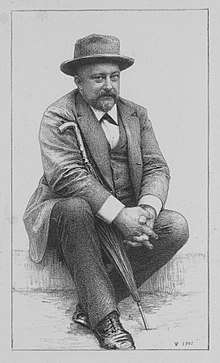Pieter Lodewijk Tak
Pieter Lodewijk Tak (Middelburg, 24 September 1848 - Domburg, 26 August 1907) was a Dutch journalist and politician.
Tak was the son of a steward in Middelburg, where, after failing law school in 1878, he started writing foreign reviews for the Middelburgsche Courant. He was friends with Floor Wibaut, who like him was a member of the Sociëteit Sint-Joris. Both Middelburgers moved to the capital, Branch in 1882. There he wrote for De Amsterdammer and De Nieuwe Gids. From the latter he took over the financial management of Frank van der Goes. After an argument he started his own literary magazine, De Kroniek (The Chronicle).

Branch was initially left-liberal, supporter of Treub. In 1899 he became a member of the Social Democratic Workers' Party ("Sociaal-Democratische Arbeiderspartij" / SDAP), and started working for Het Volk. He became editor-in-chief of the socialist party newspaper in 1903, after the party board had removed Pieter Jelles Troelstra from this position. In 1905 Tak fired the journalist Jacob Israël de Haan after the publication of his novel Pijpelijntjes. The homosexual tendency in the book was not acceptable to Tak. He did, however, advocate women's rights. From 1905 until his early death he was also party leader, member of parliament for the constituency of Franeker, member of the Provincial Council and member of the city council of Amsterdam.
P.L. Tak founded the housing association De Dageraad (The Dawn Council) in 1901. This corporation named a complex of houses in Amsterdam-Zuid in the 1920s after its founder. This housing complex is famous for its beautiful architecture in the style of the Amsterdam School.
He died in 1907 during a holiday on the Duinvliet estate near Domburg of a heart failure.
Literature
- Gilles W. Borrie: Pieter Lodewijk Tak (1848-1907), Journalist en politicus. Een gentleman in een rode broek. Aksant, Amsterdam, 2006 [1]
References
- Borrie, G.W.B. (Gilles Willem Benjamin), 1925- (2006). Pieter Lodewijk Tak (1848-1907) : journalist en politicus, een gentleman in een rode broek (2e herz. dr ed.). Amsterdam: Aksant. ISBN 90-5260-202-6. OCLC 150197940.CS1 maint: multiple names: authors list (link)